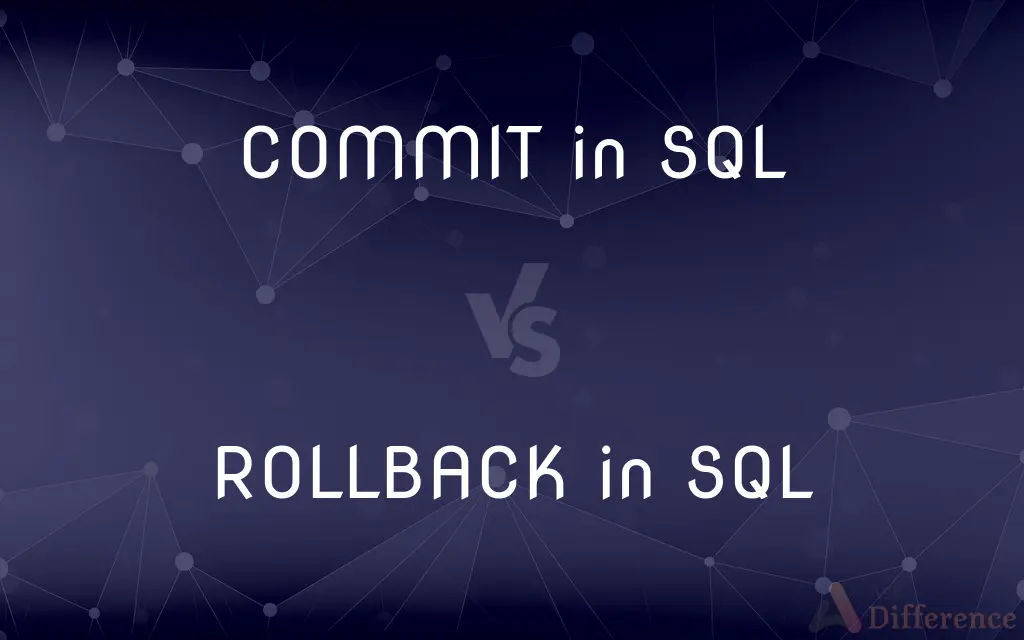COMMIT in SQL vs. ROLLBACK in SQL — What's the Difference?
By Tayyaba Rehman — Published on January 2, 2024
COMMIT in SQL finalizes a transaction, making changes permanent; ROLLBACK undoes all changes made in the current transaction.

Difference Between COMMIT in SQL and ROLLBACK in SQL
Table of Contents
ADVERTISEMENT
Key Differences
COMMIT in SQL is a command used to permanently save all changes made during the current transaction in a database. Once a COMMIT is executed, the changes made by the transaction are permanently applied to the database, and they cannot be undone without executing another transaction. On the other hand, ROLLBACK in SQL is used to undo any changes that have been made in the current transaction. It reverts the state of the database to what it was before the transaction began.
The use of COMMIT is essential in maintaining data integrity, as it ensures that all operations within a transaction are completed successfully before making the changes permanent. If any error occurs during the transaction, the COMMIT will not be executed, preventing any partial or faulty changes. In contrast, ROLLBACK is crucial for error handling in SQL. If an error or issue is detected during a transaction, ROLLBACK can be used to cancel all changes made in that transaction, thus maintaining the database's previous state.
COMMIT operations are typically used in scenarios where multiple related changes need to be made simultaneously, such as updating several tables that are interdependent. Only after ensuring that all operations are successful, a COMMIT is executed. Conversely, ROLLBACK is used during testing or when an unexpected situation arises, allowing developers and database administrators to revert to a safe state without affecting the database's integrity.
In terms of transaction management, COMMIT marks the end of a successful transaction, allowing the database to begin other transactions. ROLLBACK, however, indicates that a transaction has been unsuccessful or needs to be terminated, bringing the database back to its previous consistent state.
In summary, both COMMIT and ROLLBACK are fundamental commands in SQL for managing transactions. COMMIT is used to finalize transactions and make changes permanent, while ROLLBACK is used to undo changes and revert the database to its original state before the transaction began.
ADVERTISEMENT
Comparison Chart
Purpose
Finalizes and saves changes permanently
Undoes changes made in the transaction
Usage Scenario
Used when changes are correct and complete
Used when errors occur or changes are incorrect
Impact on Database
Makes changes irreversible without another transaction
Reverts database to state before transaction
Role in Transaction
Marks the successful end of a transaction
Cancels the current transaction
Data Integrity
Ensures data integrity by saving valid changes
Protects data integrity by discarding invalid changes
Compare with Definitions
COMMIT in SQL
COMMIT is used to end a transaction successfully.
After all payment records were updated, a COMMIT was done to complete the transaction.
ROLLBACK in SQL
ROLLBACK cancels a transaction and restores the previous state.
Due to incorrect data entry, we used ROLLBACK to cancel the transaction.
COMMIT in SQL
COMMIT ensures data integrity by committing valid changes.
To ensure the data's integrity, COMMIT was used after the batch update.
ROLLBACK in SQL
ROLLBACK is used when an error occurs during a transaction.
After detecting a processing error, a ROLLBACK command was issued immediately.
COMMIT in SQL
COMMIT in SQL permanently saves all changes made in a transaction.
After updating the customer's address, I used COMMIT to save the changes.
ROLLBACK in SQL
ROLLBACK reverts the database to its state before the transaction.
To undo the recent updates, ROLLBACK was executed to restore the original data.
COMMIT in SQL
COMMIT makes all modifications during a transaction permanent.
After successfully adjusting the inventory levels, the COMMIT command was executed.
ROLLBACK in SQL
ROLLBACK protects data integrity by discarding invalid changes.
ROLLBACK was necessary to maintain data integrity after the failed update.
COMMIT in SQL
COMMIT finalizes transactions in a database.
Once we confirmed the order details, we executed COMMIT to finalize the order transaction.
ROLLBACK in SQL
ROLLBACK in SQL undoes changes made in the current transaction.
When the script encountered an error, ROLLBACK was used to revert the changes.
Common Curiosities
When should I use COMMIT in SQL?
Use COMMIT when you are sure that all changes in the transaction are correct and should be saved.
Does COMMIT in SQL affect other users?
Yes, once COMMIT is executed, the changes become visible to other users.
What is COMMIT in SQL?
COMMIT in SQL is a command used to permanently save the changes made in a transaction.
In what scenario is ROLLBACK used?
ROLLBACK is used when an error occurs or if you decide to cancel the transaction.
Is COMMIT reversible in SQL?
No, once a COMMIT is executed, the changes cannot be reversed without executing another transaction.
What happens if I don’t use COMMIT or ROLLBACK?
If neither is used, the transaction remains open and changes are not finalized or reverted.
Can I use ROLLBACK after COMMIT in SQL?
No, once COMMIT is executed, you cannot use ROLLBACK to undo those changes.
What does ROLLBACK do to the database?
ROLLBACK reverts the database to its state prior to the start of the transaction.
Can I use COMMIT and ROLLBACK in a nested transaction?
Yes, but their behavior depends on the specific SQL database's handling of nested transactions.
What is ROLLBACK in SQL?
ROLLBACK in SQL is a command used to undo changes made in the current transaction.
What happens if a power failure occurs before COMMIT?
If a power failure occurs before COMMIT, the transaction will not be saved and changes are lost.
Can ROLLBACK in SQL undo multiple changes?
Yes, ROLLBACK can undo all changes made in the current transaction.
Does ROLLBACK affect all types of SQL statements?
ROLLBACK affects most SQL statements, but there are exceptions like some DDL statements that cannot be rolled back in certain SQL databases.
Is COMMIT a transaction boundary?
Yes, COMMIT marks the end of a transaction.
Does ROLLBACK release locks held by the transaction?
Yes, ROLLBACK releases any locks held by the transaction.
Share Your Discovery

Previous Comparison
Static in Java vs. Final in Java
Next Comparison
Cognos vs. TableauAuthor Spotlight
Written by
Tayyaba RehmanTayyaba Rehman is a distinguished writer, currently serving as a primary contributor to askdifference.com. As a researcher in semantics and etymology, Tayyaba's passion for the complexity of languages and their distinctions has found a perfect home on the platform. Tayyaba delves into the intricacies of language, distinguishing between commonly confused words and phrases, thereby providing clarity for readers worldwide.
















































